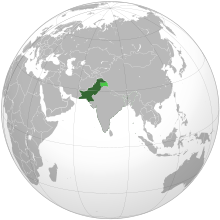Pakistan: Declining Foreign Direct Investment – Analysis
By IPCS
By D Suba Chandran
The latest quarterly report of the State Bank of Pakistan, published in June 2012, says that the foreign direct investment (FDI) in Pakistan witnessed a 36 per cent decline from US$840 million in 2011 to US$532 million in 2012. Why has there been a sharp decline in the FDI and what does this mean? Is this a trend developed over a sustained period of time or is the decline during 2011-12 an exception?
FDI in Pakistan: Recent trend in numbers

According to the Board of Investment in Pakistan, the FDI was US$485 million during 2001-02, after which there was a steady increase for the next six years. The FDI peaked during 2007-08, reaching a whopping US$5409 million. Since then, there has been a steady decline to the current 2011-12 level. In a nutshell, if the peak during 2007-08 is to be taken as a benchmark between 2001 and 2012, there was an increase by 10-15 per cent till 2007-08, and then a steady 89 per cent decline till 2011-12.
Foreign Direct Investment in Pakistan since 2001 (in US$ million)
2001-02: 485
2004-05: 1524
2006-07: 5139.60
2007-08: 5409.80
2008-09: 3719.90
2009-10: 2150.80
2010-11: 1739.40
2011-12: 595.1 (Up to April 2012)
Source: Board of Investment
Why is there a decline in FDI?
The finance minister of Pakistan, during his budget speech in early June, provided three reasons for the slow performance of the various sectors: global economic crisis, declining security situation in Pakistan and the flood situation.
Are these the real reasons for the decline in the FDI in Pakistan, or simply government excuses?
Undoubtedly, there was a global economic crisis, which peaked during the latter part of the previous decade. However, there has been a steady recovery, especially relating to the global FDI outflow. According to the Global Investment Trends Monitor of the United Nations Conference on Trade and Development (UNCTAD), the “global foreign direct investment outflows rose by 16 per cent in 2011, to an estimated US$1.66 trillion, surpassing the pre-crisis level, but still 25 per cent short of the 2007 peak.” The overall FDI outflows of the US -the largest FDI source for Pakistan- has increased to the pre-crisis period, and so has the outflows of the UK, Italy and the Gulf countries, such as Bahrain, Kuwait, Qatar, the UAE and Saudi Arabia, who are also the sources of Pakistan’s FDI. Clearly, there has been a crisis, but the FDI outflows of the countries, which have been traditionally investing in Pakistan has recovered. Hence, drying of resources cannot be a major reason for the sharp decline of FDI in Pakistan.
If the security situation is a reason for this decline, then it would not account for the increase in the FDI levels between 2001-02 and 2007-08. Pakistan was not an ideal country for investment before 2007-08, given the instability and precarious law and order situation. International investment, in fact, has been on the increase, even, in conflict regions including Africa and South Asia.
So, there is a need to look beyond the ruling Pakistan People’s Party’s (PPP) narrative of the reasons behind the decline of the FDI in Pakistan.
Three reasons could be put forward as reasons for this decline. First is the failure of the PPP to augment the macro-economic situation. It is no coincidence that the decline has accelerated under the PPP government. Though the security situation has remained tense within Pakistan, one should not ignore the fact that the PPP government led by Yousuf Gilani is the longest serving democratic government in the history of Pakistan. Despite the deteriorating security situation, there was relatively better political stability, which the government has now squandered. What was the last major economic initiative that the PPP government attempted since it took over? The government did not give adequate attention to the economic sector, which resulted in an overall decline in all sectors, including foreign investment.
The second reason is the failure of the government to augment the energy sector. The energy crisis in Pakistan has heightened in the last two to three years; there has been continuous load shedding and power riots all over Pakistan, especially in Punjab. This in turn is bound to affect all the sectors – manufacturing to transport, where there has been considerable FDI inflow.
Finally, the most important reason for the decline in the FDI is the faulty and arrogant approach of the government vis-à-vis the international investors. In fact, the energy sector itself has substantial scope to invite substantial FDI. Unfortunately, the way in which the government has dealt with independent power producers is affecting the FDI inflow for this crucial sector. The investment in the telecom sector, which has been the major recipient of FDI, is slowing down considerably. While, there are other reasons, such as the saturation of cellular teledensity and failing average revenue per user, it is the legal cases between the government institutions (Pakistan Telecommunication Ltd in this case) and the investors that are also factors encouraging the latter in their decision to disinvest, as has been the case with the Pakcom, which has started disinvesting since 2010.
D Suba Chandran
Director, IPCS & Visiting Professor, Pakistan Studies Programme, Jamia Millia Islamia
email: [email protected]

Similar scenario apply in India also. The FDI decline & the reasons there of are equally applicable to India. Both the Govts try to pass on their failures/ domestic factors to international situation, which is not the truth.